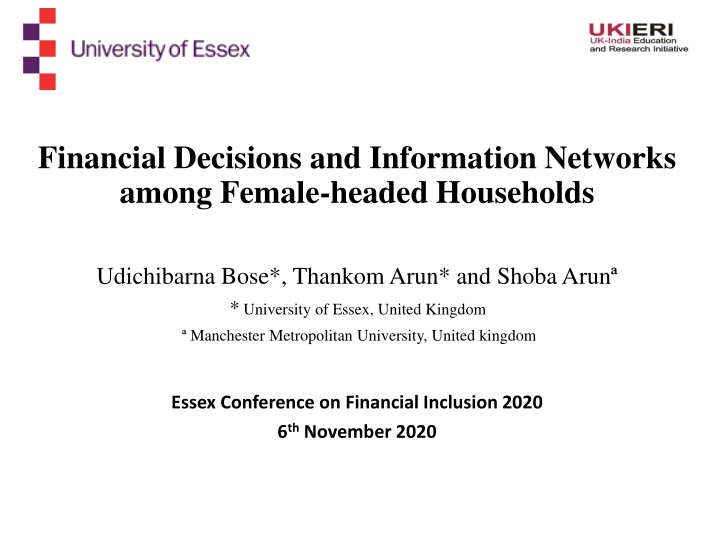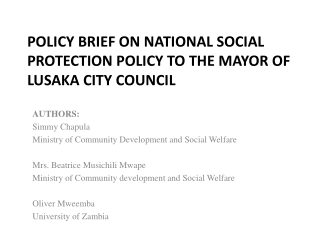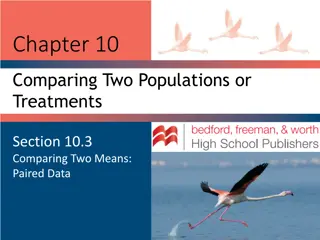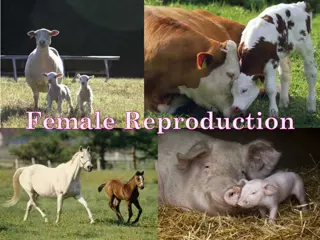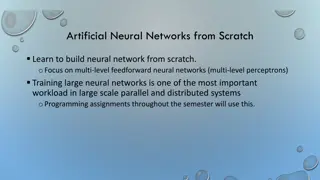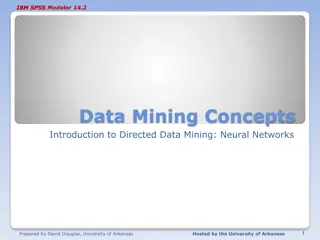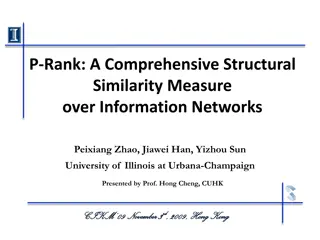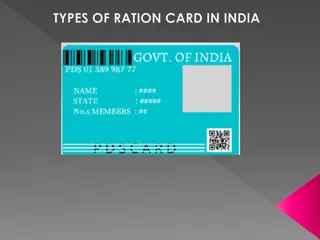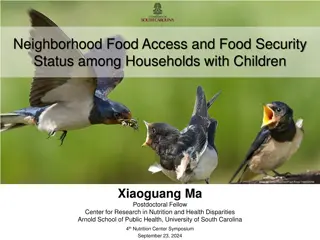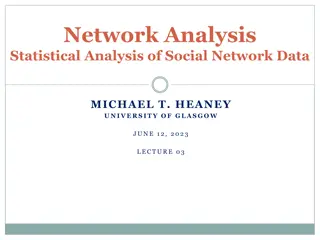Financial Decisions and Information Networks in Female-Headed Households
Highlighting the challenges faced by female-headed households in making informed financial decisions, this study explores the impact of information networks such as media and social connections. It emphasizes the mediating role of financial expertise and aims to improve the financial behavior and outcomes of these households, particularly in urban and rural areas.
Download Presentation

Please find below an Image/Link to download the presentation.
The content on the website is provided AS IS for your information and personal use only. It may not be sold, licensed, or shared on other websites without obtaining consent from the author.If you encounter any issues during the download, it is possible that the publisher has removed the file from their server.
You are allowed to download the files provided on this website for personal or commercial use, subject to the condition that they are used lawfully. All files are the property of their respective owners.
The content on the website is provided AS IS for your information and personal use only. It may not be sold, licensed, or shared on other websites without obtaining consent from the author.
E N D
Presentation Transcript
Financial Decisions and Information Networks among Female-headed Households Udichibarna Bose*, Thankom Arun* and Shoba Arun * University of Essex, United Kingdom Manchester Metropolitan University, United kingdom Essex Conference on Financial Inclusion 2020 6thNovember 2020
Media and Social Networks Making informed financial decisions remains a challenge for large parts of the population across the world (Lusardi and Mitchell, 2007; Lusardi et al., 2010). Evidence suggests that when the target audience is large, harnessing the media and social networks can prove to be an effective tool in raising awareness and changing attitudes (Atkinson and Messy, 2013). Mass media (Berg and Zia, 2017) and social interactions (Duflo and Saez, 2003) offer a powerful platform for communicating educational information and influencing behaviour.
Mediating role of financial expertise Irrespective of the fact that information networks can enhance the quality of decision-making among individuals, the success of education programmes may be limited if programmes fail to provide goal-orientated information (Braunstein and Welch, 2002). Studies show that financial experience makes people more receptive to financial education programmes, and thus helps to improve their financial literacy and financial behaviour (Mandell 2008; Frijns et al., 2014). Thus, we argue that households with financial expertise are more likely to recognise the value and better utilise the financial information provided by media and social networks in making more informed and profitable financial decisions.
Why it is important to focus on female-headed households? Female-headed households are triply disadvantaged due to the burdens of poverty, gender discrimination, and absence of support as heads of household (Buvinic and Gupta, 1997). Women who head households may face discrimination in accessing jobs or resources because of their gender, social or economic factors, which further affects their household's economic welfare. In the context of India, female-headed households pay nearly 5 percentage points higher interest cost and have 7 10 percentage points lower access to formal sources of finance as compared with male headed households (Rajeev and Bhattacharjee; 2012, 2015). Recent studies show the continuing differential vulnerability of female-headed households due to limited mobility, connectivity and access to protective social networks, jeopardizing their engagement in income generation activities (Flato et al., 2017).
Objectives of the paper To study the direct impact of information networks such as media and digital networks and social networks on the financial returns of the female-headed households. To study the influence of these information networks on the financial behaviour of households separately in urban and rural areas. To explore the mediating role of financial expertise in the relationship between information networks and financial decisions.
Contribution To the best of our knowledge, this is the first paper that focuses on the mediating role of financial expertise in the relationship between information networks and financial returns of households. We study the impact of information networks on households financial decisions in a setting of an emerging economy, whereas most studies focus on developed countries (Cole et al., 2011). We investigate the direct relationship between information networks such as media networks and social networks and financial returns among the vulnerable groups of female- headed households in both urban and rural sectors of India.
Data Data sources India Human Development Survey (IHDS) Second round of IHDS which was conducted in 2011-12. This is a unique nationally representative, multi-topic survey of Indian households in 1503 villages and 971 urban neighbourhoods. We rely on a sample of 37,964 household that are female- headed and use the self-reporting definition of female- headed as adopted in the available data sources.
Baseline Model We hypothesise that information networks such as social networks and media and digital networks help to remove informational barriers and increase the financial income of female-headed households. ????= ?0+ ?1?????? ??????????+ ?2????? ??????????+ ?3??????????+ ?4??+ ?5??+ ?? (1) Dependent variable of financial returns (??) are measured using net income from two main sources- financial investments and agricultural activities. Social networks are proxied by households regular attendance to public meetings and their memberships to at least one group such as self-help groups, credit/savings group, social/ festival society, and development group/NGO. Media and digital networks are proxied by the regular use of computer, newspaper, television by the individuals of each household.
Baseline Model These models are estimated using ordinary least squares (OLS) method with state (??) and district (??) fixed effects controlling for unobserved heterogeneity at state- and district-levels. Controls include different household-level variables such as credit, mobile use, poor, asset size, education levels, Muslim households, age and age squared of household head, Urban region, and confidence on banks.
Accounting for regional heterogeneity We construct a regional dummy variable urban that takes the value one if a household belongs to an urban area from census 2011, and zero otherwise. ????= ?0+ ?1?????? ?????????? ????????+ ?2????? ?????????? ????????+ ?3?????? ??????????+ ?4????? ??????????+ ?5????????+ ?6??????????+ ?7??+ ?8??+ ?? (2) The network*urban capture the impact of social and media networks on the financial returns of female-headed households in the urban sectors as compared to rural sectors. interaction terms of and social network*urban media
Mediating role of financial expertise We classify our female-headed households into two groups, namely households with financial expertise and households without financial expertise. Following Frijns et al., (2014) and Lusardi and Tufano (2015), we define financial experience based on individuals reported experiences with traditional saving, investing and payment activities for each household. We construct a dummy variable for financial expertise which takes value of one if individuals in a household has either bought securities in mutual funds, individual stocks and bonds, invested in fixed deposits and gold, or opened a bank savings or current account in the past five years without suffering any large amount of losses, and zero otherwise.
Summary statistics Households with financial expertise are more likely to higher financial returns, better information networks, higher access to credit, better financial and education levels as compared to households without financial expertise. Urban households have higher financial income but lower agricultural income, higher financial expertise and media networks followed by better financial and education levels as compared to rural households.
Results- Information networks, financial expertise and financial behaviour The results show a positive and significant of both social and media networks on net financial income and agricultural income. Taking into account the role of financial expertise, we find the positive and significant impact of information networks on financial returns for the households with financial expertise, while it is insignificant for the households without financial expertise.
Results- Information networks, financial expertise and financial behaviour
Results- Regional heterogeneity in information networks and financial expertise We find a positive and significant effect of both social network*urban and media network*urban on net financial income, and negative and significant effect on net agricultural income. We again find a positive and significant impact of information networks on financial income of the households with financial expertise in urban sectors, while it is insignificant for the households without financial expertise. While, find a negative and significant impact of information networks on agricultural income for the households with financial expertise in urban sectors, while it is insignificant for the households without financial expertise.
Results- Regional heterogeneity in information networks and financial expertise
Robustness tests Instrumental variable method- Endogeneity concerns arising due to unobservable factors and reverse causality are corrected using the two-staged least squares (2SLS) method. Alternative mediation test for financial expertise- We analyse the mediation effect of financial expertise using Baron and Kenny's (1986) mediation test which is the most widely-used method for testing mediation hypotheses.
Conclusion The results confirm a positive effect of information networks on households net income from financial and agricultural investments in both urban and rural sectors. We find that the positive relationship between information networks and financial behaviour is only significant for the female-headed households with financial expertise, confirming the mediating role of financial expertise. Thus, media and social networks indeed has the power to capture the attention of masses unlike any other medium, and thereby provide policy makers with an effective tool to deliver carefully designed educational messages on social, financial and health issues. These networks particularly have the potential to empower women both individually and collectively, which may lead to better awareness and financial well-being.
